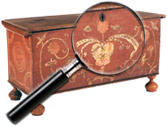Adolf Wolfli (Swiss, 1864 to 1930)
The Swiss artist Adolf Wolfli is considered among the greatest exemplars of Art Brut. Born in poverty, orphaned before the age of ten, mistreated and abused in a series of foster homes, by the time he was in his twenties he had been twice arrested for attempted sexual abuse. After the second arrest in 1895 he was sent to Waldau Clinic in Bern, Switzerland, where he was diagnosed with schizophrenia and where he remained until his death. In 1908 he started work on an illustrated personal mythology that filled 46 books in 25,000 pages by the time of his death. He divided the narrative – composed of prose, poetry, musical compositions, and some 1600 drawings and 1600 collages – into five parts: From the Cradle to the Grave (nine books; 1908–12), Geographic and Algebraic Books (seven books; 1912–16), Books with Songs and Dances (six books; 1917–22), Album Books with Dances and Marches (eight books; 1924–28), and Funeral March (16 books; 1928–30, unfinished). From 1916 on Wolfli also produced what he called Brotkunst (“bread art”), single-sheet drawings he would sell for income or exchange for art supplies and tobacco. Though independent of the narrative work, the bread art echoes its themes. His international reputation was established on these drawings.
Jean Dubuffet first encountered his work on a tour of Switzerland in 1945 and designated him “le grand Wolfli”. Wolfli’s work figured prominently in Dubuffet’s Art Brut manifesto and collection, but otherwise received little attention until 1972, when the Swiss curator Harald Szeemann presented a selection of the bread art at Documenta 5 in Kassel, Germany. Wolfli’s great narrative only began to be systematically examined and transcribed in 1975 when it was taken from the Museum of the Waldau Clinic to the newly established Adolf Wolfli Foundation at the Bern Museum of Fine Arts, Bern, Switzerland. Wolfli’s work is held in every major public and private collection of outsider art worldwide.
Information Courtesy of Rago Arts, October, 2019.
